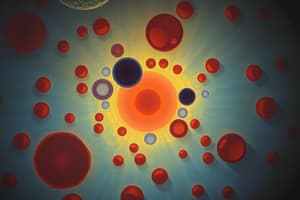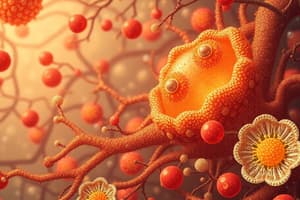Podcast
Questions and Answers
Which organelle is responsible for synthesizing proteins and lipids in a cell?
Which organelle is responsible for synthesizing proteins and lipids in a cell?
- Cytoskeleton
- Lysosomes
- Mitochondria
- Golgi Apparatus (correct)
What is the main function of mitochondria within a cell?
What is the main function of mitochondria within a cell?
- Digest waste materials
- Produce energy (correct)
- Provide structural support
- Control what enters and exits the cell
Which organelle is responsible for digesting waste materials and broken organelles within a cell?
Which organelle is responsible for digesting waste materials and broken organelles within a cell?
- Cytoskeleton
- Endoplasmic Reticulum
- Nucleus
- Lysosomes (correct)
What is the function of the plasma membrane in a cell?
What is the function of the plasma membrane in a cell?
Which organelle is involved in synthesizing proteins and lipids, as well as playing a role in detoxification and calcium storage?
Which organelle is involved in synthesizing proteins and lipids, as well as playing a role in detoxification and calcium storage?
What is the main difference between nerve cells and red blood cells?
What is the main difference between nerve cells and red blood cells?
In terms of function, what is the main similarity between nerve cells and white blood cells?
In terms of function, what is the main similarity between nerve cells and white blood cells?
What distinguishes red blood cells from white blood cells?
What distinguishes red blood cells from white blood cells?
Which statement accurately represents the relationship between cell function and structure?
Which statement accurately represents the relationship between cell function and structure?
In the context of cell biology career opportunities, what is a common role for researchers?
In the context of cell biology career opportunities, what is a common role for researchers?
Flashcards are hidden until you start studying
Study Notes
Cell Biology Overview
Cell biology is the branch of biology that studies the structure, function, growth, division, interaction, and organization of cells. At the heart of life are billions of tiny units called cells, each containing a wide array of organelles and structures. Each cell type has a unique combination of these structures, which allow it to perform multiple functions within living organisms.
Structure and Function
Cells have a nucleus surrounded by a membrane, with various organelles inside that perform specific functions. For example, mitochondria produce energy, while endoplasmic reticulum synthesizes proteins and lipids. Plasma membranes control what enters and exits the cell, while cytoskeleton provides structural support and helps with movement. Nuclear pores allow the exchange of molecules between the nucleus and cytoplasm, facilitating communication among organelles.
Organelles
Cells have several specialized structures called organelles, which are unique subunits within cells that have separate functions. Some common organelles include:
- Endoplasmic Reticulum: Synthesizes proteins and lipids, and plays a role in detoxification and calcium storage.
- Mitochondria: Produces energy through cellular respiration.
- Golgi Apparatus: Processes proteins and modifies their structure before transporting them out of the cell.
- Lysosomes: Digests waste materials and broken organelles within the cell.
Differences and Similarities
Cell biology involves understanding how cells communicate with each other, both within the same tissue and between different tissues. Cells can be similar in terms of function but differ in structure, such as nerve cells that conduct electrical signals through long extensions called axons and dendrites. Conversely, some cells may have similar structures but different functions, like red blood cells that primarily transport oxygen and white blood cells that fight infections.
Career Opportunities
A career in cell biology can be rewarding, with opportunities in both academic and industrial settings. Researchers can work on understanding cellular processes, developing new treatments for diseases, or creating new technologies. They may also teach at universities or work in biotechnology companies, contributing to drug discovery and product development.
In summary, cell biology is a fascinating field that explores the fundamental structure and function of cells, their interactions, and how they contribute to the overall health and function of living organisms. Understanding cell biology is essential for advancing our knowledge of life processes and developing new treatments for diseases.
Studying That Suits You
Use AI to generate personalized quizzes and flashcards to suit your learning preferences.




